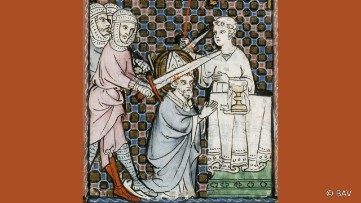St. Thomas Becket, Bishop of Canterbury, Martyr

“For the name of Jesus and the protection of the Church, I am ready to embrace death.” These were the words St. Thomas is reported to have uttered before his murder. He had been a man of power, accustomed to command. He died as a servant of Christ and a martyr: keeping the faith and to preserving the freedom of the Catholic Church.
Statesman
Born in London in 1118, Thomas was of Norman stock. He was initiated into an ecclesiastical career at a young age. Trained in the abbey of Merton, he later studied in France and at the University of Bologna and soon distinguished himself for his intellectual qualities. In 1154 he became archdeacon of the diocese of Canterbury and the following year, the new king of England, Henry II, appointed him chancellor of the realm. Thomas was the king’s most trusted man. He lived a comfortable life, and did not disdain the symbols and privileges of power. However, the future Saint did not fail in generosity towards the poor, and showed an inner freedom even in the face of the sovereign, to whom he was not only a counselor, but also a trusted friend.
At the service of the Church
The turning point in the life of Thomas Becket took place in 1161 when he accepted election as Archbishop of Canterbury. That appointment was strongly advocated by King Henry, who would never have thought of finding a proud adversary in the man, who was once his closest collaborator. Thomas, however, was from then, on, a servant first of a man far greater than the king of an earthly state. The contrast intensified when Henry II sought to limit the freedom and independence of the Catholic Church in England, through the Clarendon Constitutions. The king asked Thomas to sign the Charter to limit the prerogatives of the Church, but found an insurmountable bulwark in the new Archbishop of Canterbury. Thomas refused decisively: “In the name of God Almighty, I will not put my seal.” The old friend thus becomes, in the eyes of the king, a bitter enemy.
Martyr of faith and freedom
Thomas would know the bitterness of exile: after a trial, he fled to France and was first the guest of a Cistercian monastery in Pontigny, for two years. He would spend six years away from his homeland, all told. When he returned to Canterbury he met the joyful reception of the faithful, but an even deeper aversion from the Crown. It is said that one day Henry II exclaimed in exasperation, words to the effect of, “Will no one rid me of this turbulent priest!” - an exhortation taken literally by four knights who left London for Canterbury. Thomas Becket was barbarously killed by stabbing inside his Cathedral. It was December 29, 1170. It is said that the question of the murderers, “Where is Thomas the traitor?” was answered with, “I am here, though I am not a traitor, but a bishop and priest of God.” The commotion aroused by this killing was immense, reaching far beyond the borders of England, so much so that only three years later, on 21 February 1173, Pope Alexander III recognized his martyrdom, elevating him to the honor of the altars.







